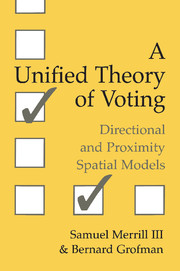Book contents
- Frontmatter
- Contents
- List of Tables and Figures
- Acknowledgments
- 1 Introduction
- Part I Models of Voter Behavior
- Part II Models of Party or Candidate Behavior and Strategy
- 8 Equilibrium Strategies for Two-Candidate Directional Spatial Models
- 9 Long-term Dynamics of Voter Choice and Party Strategy
- 10 Strategy and Equilibria in Multicandidate Elections
- 11 Strategy under Alternative Multicandidate Voting Procedures
- Postscript
- Appendices
- Glossary of Symbols
- References
- Index
9 - Long-term Dynamics of Voter Choice and Party Strategy
Published online by Cambridge University Press: 04 December 2009
- Frontmatter
- Contents
- List of Tables and Figures
- Acknowledgments
- 1 Introduction
- Part I Models of Voter Behavior
- Part II Models of Party or Candidate Behavior and Strategy
- 8 Equilibrium Strategies for Two-Candidate Directional Spatial Models
- 9 Long-term Dynamics of Voter Choice and Party Strategy
- 10 Strategy and Equilibria in Multicandidate Elections
- 11 Strategy under Alternative Multicandidate Voting Procedures
- Postscript
- Appendices
- Glossary of Symbols
- References
- Index
Summary
Our political solar system, in short, has been characterized not by two equally competing suns, but by a sun and a moon.
Lubell, The Future of American Politics (1952: 200)Why Is There Limited Polarization and Alternation of Parties?
Contrary to the expectations of the median voter theorem in one dimension, empirical evidence implies that the policies of the two major parties in American politics do not in fact converge (Brady and Lynn, 1973; Bullock and Brady, 1983; Poole and Rosenthal, 1984b; Alesina and Rosenthal, 1995: section 2.6). Why is this so?
Alesina and Rosenthal (1995: 17) distinguish between the Downsian model in which “parties choose policy in order to win elections” and a partisan model in which “the parties want to be elected in order to choose policies.” This idea suggests a trade-off between a desire to win and a desire to implement policy that motivated Wittman (1977, 1983), Calvert (1985), and Brams and Merrill (1991). Their models also take account of uncertainty about the distribution of voter preferences. Each of these analyses assumes a Euclidean loss function for each party as the spatial location of implemented policy recedes from that of desired policy, and each draws a conclusion of partial convergence, i.e., optimal party strategies lie intermediate between those implied by pure vote seeking and pure policy seeking. Wittman emphasizes the breakdown of convergence under these assumptions, while Calvert points out that the departure from convergence is only gradual as the traditional assumptions are continuously relaxed.
Information
- Type
- Chapter
- Information
- A Unified Theory of VotingDirectional and Proximity Spatial Models, pp. 128 - 143Publisher: Cambridge University PressPrint publication year: 1999
